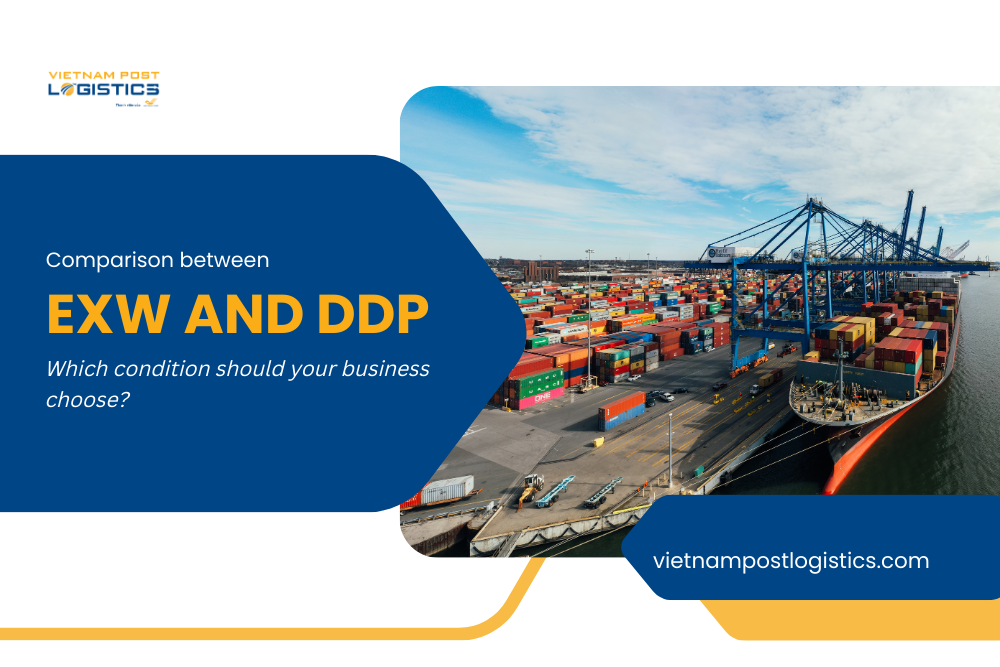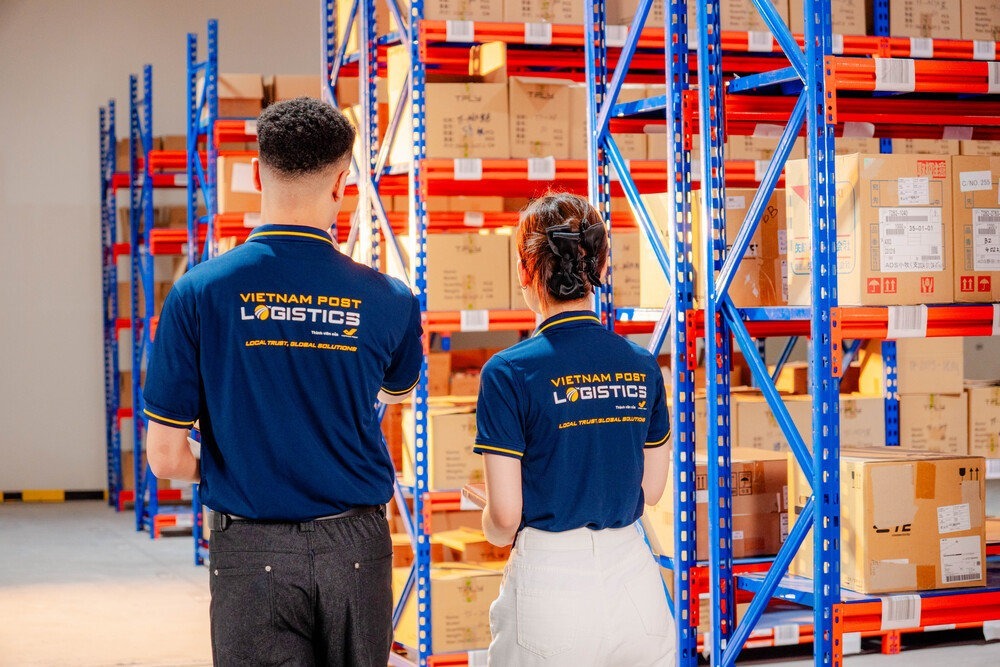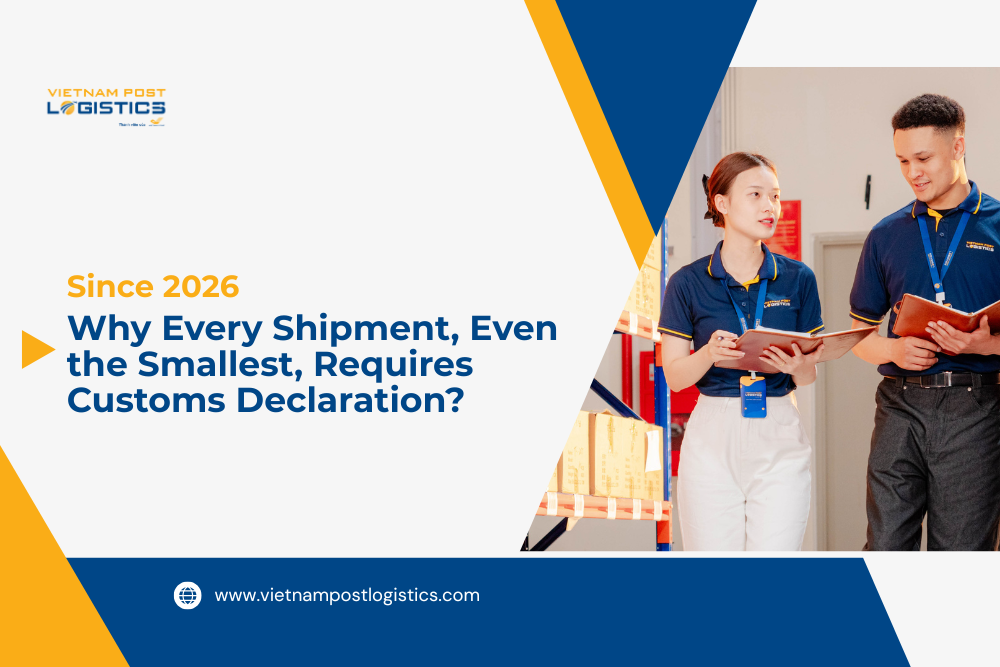
Comparison between EXW and DDP: Which condition should your business choose?
 Vietnam Post Logistics
Vietnam Post Logistics
 20 August, 2025
20 August, 2025
 5 phút đọc
5 phút đọc
In international trade, selecting the right delivery terms not only impacts logistics costs but also influences the level of control, risk, and reputation a business holds in the eyes of its partners.
Two seemingly opposite conditions that are frequently used by businesses are EXW (Ex Works) and DDP (Delivered Duty Paid). One means “take care of everything yourself,” while the other means “responsible until the goods reach the buyer.”
So, which is the right choice for your business? Let’s compare EXW and DDP in detail – from characteristics and benefits to appropriate use cases – to help you make a strategic decision for each deal.

Overview of EXW and DDP
In international trade, Incoterms are the rules that clearly define the responsibilities, costs, and risks between buyers and sellers in cross-border transactions. Among them, EXW (Ex Works) and DDP (Delivered Duty Paid) stand at two opposite ends: in EXW, the seller bears almost no responsibility, while in DDP, the seller takes on the entire process.
Understanding the differences between these two conditions is essential for businesses to:
- Plan logistics accurately
- Optimize overall costs
- Minimize trade disputes
- More importantly, choose a strategy that matches their capacity and growth goals
Here is a quick comparison of the basic criteria between EXW and DDP:
| Criteria | EXW (Ex Works) | DDP (Delivered Duty Paid) |
|---|---|---|
| Seller’s responsibility | Only prepare goods at the warehouse | Responsible for the full process, including delivery to the buyer’s address |
| Buyer’s responsibility | Manage everything: pickup, customs, transportation | Just wait to receive goods at the delivery address |
| Risk for the seller | Low | High (import side issues, taxes, customs, etc.) |
| Risk for the buyer | High | Low |
| Logistics complexity | Managed by the buyer | Managed by the seller |
| Level of control | Buyer has full control | Seller controls the entire process |
| Best suited for | Buyers with strong logistics capability | Sellers with an international logistics system |
When should you choose EXW – “Do it all yourself”?
EXW (Ex Works) is the right choice when:
- You are an international buyer who wants to control the entire import process: from choosing the forwarder, transport route, to customs costs and taxes.
- You have a strong logistics partner in the exporting country (or work with Vietnam Post Logistics, which provides EXW pickup abroad).
- You have experience handling foreign-side issues: customs clearance, documents, and environmental taxes.
- You negotiate competitive base prices and are willing to manage logistics risks.
Example:
A company in Vietnam imports raw materials from China for production. They often choose EXW because they already have transportation partners, border warehouses, and export customs experience – helping them save costs and control timelines.
When should you choose DDP – “Delivered to your door without worries”?
On the other hand, DDP (Delivered Duty Paid) is the ideal choice when:
- You are a seller wanting to provide a full-service experience for international customers.
- Your customers require door-to-door delivery and do not want to handle logistics.
- You want to maintain control over the entire logistics process, ensuring on-time and compliant delivery.
- You partner with a logistics provider capable of handling customs and taxes at the destination country, such as Vietnam Post Logistics.
Example:
A company exporting packaged food from Vietnam to the U.S. through Amazon must choose DDP, because Amazon requires goods to be delivered directly to FBA warehouses – with all taxes and customs cleared – and buyers do not assist with import procedures.
EXW & DDP – Not opposites, but different strategies
Many businesses think EXW and DDP are two extremes: one side “avoids all responsibility,” while the other “takes on all risks.” But in reality, if managed well, both can create competitive advantages in specific situations:
- EXW creates attractive import prices: if you have a strong logistics system, you can get good base prices and optimize operations.
- DDP creates a professional service experience: helping international sellers build credibility, especially on global e-commerce platforms or in B2B distribution.
The key questions for businesses are:
- Where is your strength – logistics, legal, or finance?
- What are the specific requirements of your target market?
- Do you already have a reliable logistics partner to support your weaker areas?
Choosing EXW or DDP according to your strengths – with Vietnam Post Logistics

Vietnam Post Logistics is not just a transporter, but a comprehensive logistics ecosystem and a strategic partner helping import-export businesses choose the right condition – and execute the right strategy:
If you choose EXW:
- Vietnam Post Logistics supports pickup from sellers’ warehouses, including in China, Korea, the EU, and the U.S.
- Handles export customs, international shipping, and delivery to Vietnam warehouses.
- Helps you truly control the logistics chain from the start without depending on the seller.
If you choose DDP:
- Vietnam Post Logistics handles customs declaration, tax payment, and final delivery at the importing country.
- Processes documents, HS codes, and import permits according to local laws.
- Provides end-to-end consulting so you avoid risks and hidden fees.
Vietnam Post Logistics helps you not just “choose EXW or DDP,” but choose the right way to strengthen your logistics capacity in line with your international business strategy.
EXW or DDP is not a right-or-wrong question, but a strategic choice. If you are a buyer with strong logistics, EXW gives you control and cost savings. If you are a seller aiming to offer full service and boost international credibility, DDP is the key.
With Vietnam Post Logistics’ end-to-end capabilities, you can confidently choose either condition – knowing you have a partner who supports you from the seller’s warehouse to the buyer’s hands, anywhere in the world.
Có thể bạn sẽ thích?
- Since 2026: Why Every Shipment, Even the Smallest, Requires Customs Declaration?
- Vietnam Post Logistics Implements 2026 Development Plan and Summarizes Trade Union Activities 2025
- Vietnam Post Logistics & PNS Network Vina – Expand Strategic Partnership to Strengthen Logistics Capabilities in Vietnam












